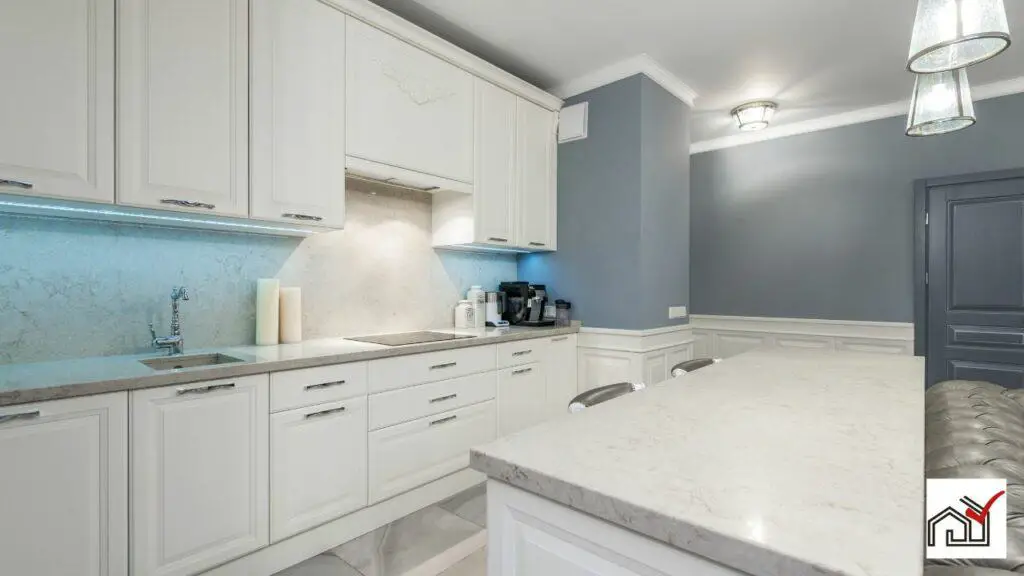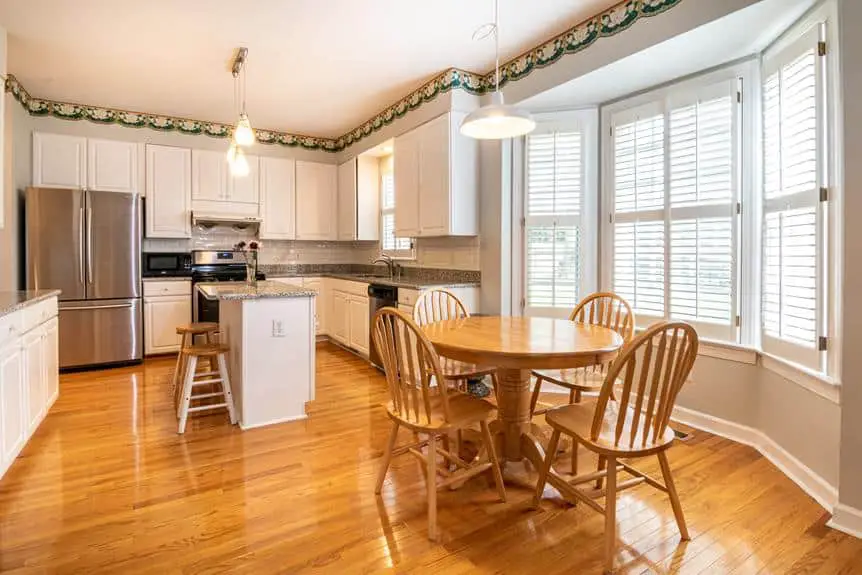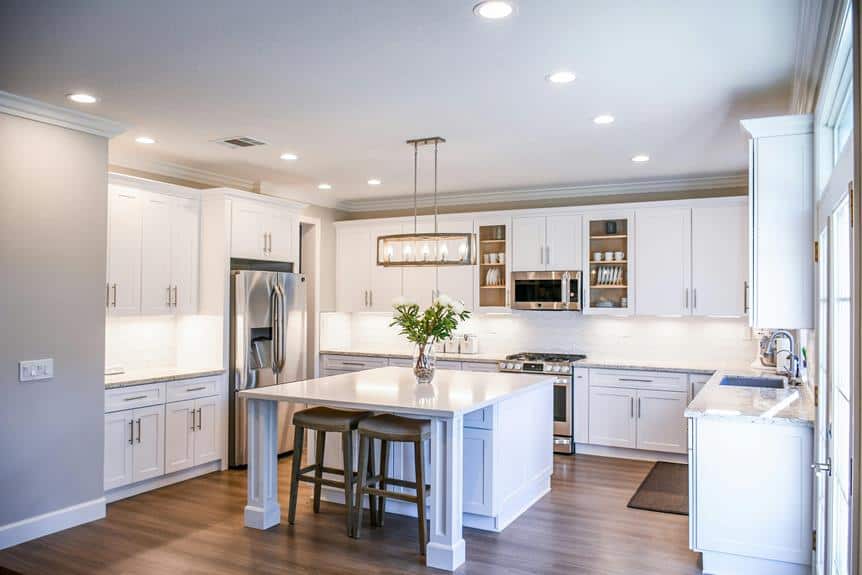Installing a tile or solid-surface countertop in your kitchen or bathroom can be a considerable investment, but it doesn’t have to be.
Both porcelain and quartz countertops are popular choices for homeowners who want great-looking surfaces that aren’t just granite or marble.
However, each of them has its own pros and cons. So how do you choose between these two countertops?
Here are 10 key differences between porcelain and quartz countertops to help you figure out what is best for you.
1. Composition
When it comes to composition, porcelain and quartz countertops are very different.
Porcelain countertops are made from a combination of kaolinite, feldspar, silica, and mineral oxides.
This mixture of minerals creates a strong and durable material that is available in many beautiful colors.
Meanwhile, quartz countertops are very different than their porcelain counterpart.
They are made from a combination of quartz chips and dust that are bound together by resin.
This gives them their distinct speckled appearance.
However, don’t confuse quartz with quartzite.
Quartzite occurs naturally, while quartz can technically be considered an engineered stone due to its composition.
2. Visual Appearance
It can be difficult to differentiate between quartz and porcelain countertops visually.
However, experienced professionals can notice subtle differences between the two on closer inspection.
Quartz countertops are made from a combination of crushed rock, resin, polymers, and sometimes pigments to create the look of natural stones such as marble or granite.
Because of this, their color and patterns permeate through the entire slab.
Whereas with Porcelain, the design patterns are only present on the top.
So if you chip this countertop, the inside surface will just be one solid color without any design patterns.
3. Finish
When you choose porcelain countertops, you are typically limited to either a polished (high-gloss glaze) or an unpolished (matte) finish.
This is because the finish is applied on porcelain countertops during its manufacturing.
On the other hand, quartz countertops offer 3 different finishes.
You can opt for either a polished, honed, or leathered finish.
Polished quartz countertops are highly reflective and look sleek.
Honed quartz countertops are matte and velvety to the touch.
And leathered quartz countertops have a subtle sheen that gives them an elegant look.
So no matter which countertop you choose, there’s certainly no shortage of beauty options.
4. Durability
When it comes to durability, both porcelain and quartz countertops have a lot to offer.
Quartz is virtually indestructible, and it’s thicker and heavy-duty than porcelain.
So it can withstand heavy use with little signs of wear and tear.
Porcelain slabs are also virtually indestructible.
However, they are lighter and more fragile during installation.
So they need to be handled with care before installation. However, they are incredibly durable once installed.
Overall, if you are looking for a countertop that can stand up to the test of time without requiring too much maintenance, either porcelain or quartz would do the job.
5. Heat Resistance
Porcelain countertops are highly heat-resistant. You can keep a hot pot on them without them melting or warping.
These countertops also won’t get discolored from direct exposure to sunlight.
Quartz countertops aren’t as heat-resistant as porcelain ones.
However, they won’t melt instantly when a hot object touches them.
But prolonged contact with a hot object can lead to warping and discoloration over time.
So it’s best to use a trivet while keeping hot items on quartz countertops.
All in all, if you are looking for a countertop that can withstand high levels of heat, porcelain countertops are the best choice between the two.
6. Scratch Resistance

Porcelain has a hard surface that is relatively scratch-resistant.
However, porcelain can get scratched by ceramic knives if they aren’t handled properly.
On the other hand, quartz countertops are more scratch-resistant. But if enough force is applied, they may scratch too.
While neither material is completely scratch-proof, quartz countertops offer greater protection against scratches than porcelain ones.
7. Edge Options
When it comes to edge options, quartz countertops reign supreme.
With choices such as full bullnose, ogee, beveled and straight edges, you can have diverse edges that can match any design style, from traditional to modern.
Porcelain countertops are thinner than quartz. So there are fewer edge options available for them.
The common edges used for porcelain countertops are mitered and square.
8. Thickness
Quartz countertops are typically thicker than porcelain ones.
This allows for greater flexibility when it comes to finishing details like edges.
While the variety of available edge options for porcelain countertops is still somewhat limited, it won’t stay this way for long, given their rise in popularity!
9. Installation
Porcelain countertops can be installed above existing countertops without removing them.
This means that porcelain countertops are labor and cost-effective.
On the other hand, quartz countertops are a bit heavier and bulkier. So they need to be installed directly on the cabinets.
In some cases, new cabinets may be needed to provide adequate support for these slabs.
This means that porcelain countertops are more convenient and cost-effective for installation than quartz countertops.
10. Cost
If you are considering getting a new countertop, then the cost will most likely be the deciding factor for you.
Porcelain countertops are usually cheaper than quartz countertops. Porcelain slabs typically range from $55 to $120 per square foot, while quartz countertops generally cost around $45 to $200 per square foot.
Keep in mind that the finish and size of the countertops will also affect the total cost.
If you have a smaller surface area to cover, then quartz countertops may work out cheaper than porcelain.
Further Reading: Porcelain Countertop Costs (Explained for First-Timers)
Which Countertop Should You Choose, Porcelain or Quartz?
Both porcelain and quartz countertops are excellent additions to any home.
But depending on what you are looking for, one might suit your needs better than the other.
Porcelain countertops are less expensive than quartz countertops in the short term.
They also come in various styles that can last for years if maintained properly.
However, when it comes to durability and low maintenance, quartz countertops are the clear winner.
Quartz countertops are ideal for areas that need consistent and reliable performance day in and day out.
However, porcelain countertops are better for outdoor areas because they can withstand extreme weather conditions.




